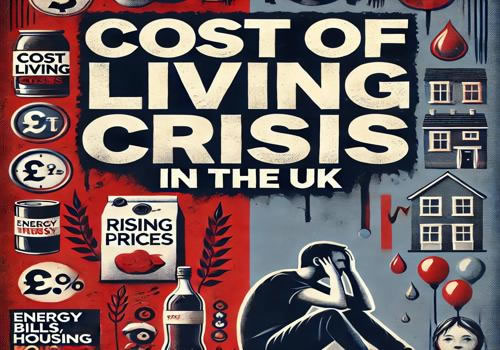
Food Insecurity and the Rising Cost of Living in the UK: A Growing Crisis
Introduction
In recent years, the UK has been grappling with an increasingly urgent issue: food insecurity. Once considered a problem predominantly affecting developing countries, food insecurity has now become a pressing concern within the borders of one of the world’s wealthiest nations. The situation has been exacerbated by the rising cost of living, driven by inflation, supply chain disruptions, and economic instability. For many households, putting food on the table has become a daily struggle. This blog explores the factors contributing to food insecurity in the UK, the human impact of this crisis, and what can be done to address this growing problem.
The Rise of Food Insecurity
Food insecurity is defined as the lack of reliable access to sufficient quantities of affordable, nutritious food. In the UK, it is estimated that millions of people are living in food-insecure households. This issue has been on the rise for several years, but the COVID-19 pandemic and the subsequent economic fallout have significantly worsened the situation. According to recent studies, the number of people relying on food banks has reached record levels, with many families being forced to choose between heating their homes and feeding their children.
Factors Contributing to the Crisis
- Rising Cost of Living
- The cost of living in the UK has surged, with inflation rates reaching their highest levels in decades. The prices of essential goods such as food, fuel, and housing have skyrocketed, placing immense financial pressure on households, particularly those with low incomes. The increase in energy bills has also meant that many families are left with less disposable income to spend on food.
- Economic Instability
- The UK economy has faced significant challenges in recent years, including the impacts of Brexit, the pandemic, and global supply chain disruptions. These factors have led to job losses, reduced working hours, and wage stagnation, making it increasingly difficult for many people to afford basic necessities.
- Welfare System Gaps
- The UK’s welfare system, while providing essential support to many, has been criticized for not adequately addressing the needs of the most vulnerable. Issues such as delays in Universal Credit payments, benefit caps, and the removal of the £20 uplift have left many households struggling to make ends meet. This has led to an increased reliance on food banks and other forms of emergency food assistance.
The Human Impact
The impact of food insecurity extends far beyond hunger. It affects physical and mental health, educational outcomes, and overall well-being. Children in food-insecure households are more likely to suffer from malnutrition, which can have long-term consequences on their development and academic performance. Adults facing food insecurity often experience anxiety, depression, and social isolation, as the stigma associated with poverty and hunger takes a toll on their mental health.
Moreover, food insecurity disproportionately affects certain groups, including single-parent households, ethnic minorities, and people with disabilities. These communities are often already marginalized and face additional barriers to accessing adequate food and support.
What Can Be Done?
Addressing food insecurity in the UK requires a multifaceted approach that tackles both the immediate needs of those going hungry and the underlying causes of the crisis.
- Strengthening Food Assistance Programs
- The government should invest in expanding and improving food assistance programs, including food banks, school meal programs, and community kitchens. Ensuring that these services are accessible to all who need them is crucial.
- Addressing the Root Causes
- Long-term solutions must focus on addressing the root causes of food insecurity, such as poverty and inequality. This includes increasing the minimum wage, providing adequate social security benefits, and ensuring that everyone has access to affordable housing and healthcare.
- Supporting Local Initiatives
- Local communities play a vital role in combating food insecurity. Supporting community-led initiatives, such as food cooperatives, urban gardens, and local food distribution networks, can help create sustainable solutions and foster resilience.
- Raising Awareness
- Public awareness and advocacy are essential in driving change. By raising awareness about the extent of food insecurity in the UK and challenging the stigma associated with it, we can build a movement for systemic change.
Conclusion
Food insecurity in the UK is a growing crisis that demands urgent action. As the cost of living continues to rise, more and more families are being pushed into poverty and hunger. While immediate food assistance is crucial, it is equally important to address the broader economic and social issues that contribute to this problem. By working together—government, communities, and individuals—we can help ensure that everyone in the UK has access to the food they need to live healthy, fulfilling lives.
Call to Action
Supporting organizations like the Just Penny Foundation, which is dedicated to combating food insecurity and supporting vulnerable communities, is one way to make a difference. Whether through donations, volunteering, or advocacy, every contribution helps to alleviate hunger and create a fairer, more equitable society.

